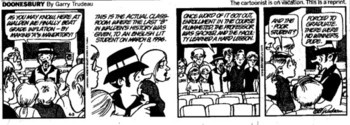- 9/28/04: After seeing the film Outfoxed
(official Outfoxed
site) about how the Fox "News" network systematically obfuscates
opinion and fact, I think historians need to focus more than ever on teaching
students how to assess the reliability and relevance of their sources.
This is a step that would precede the interpretation of primary
source material, which many World History courses (and
the notorious DBQ) emphasize. 11/10/05: here are some good sites:
- June 10, 2008: Sample
papers page with 4 prizewinning papers now available, and (finally)
the results of the midterm
survey.
- Sept. 3, 2008: Now some bloglike thoughts on how to
restructure the course the next time I teach it. Number 1: refuse to teach
it in Campbell Hall. The entertainment venue is not at all conducive to
the more demanding, less entertaining way I conceive of my courses, as
the comments on the student evals (and RateMyProfessor) bear out. [scan
ESCI form when it resurfaces]
- Sept 2009
- 9/24/09, 7am, updated 5pm: "Crashing" Hist
2c. There is very little chance that this will be possible. If you
want to try anyway, here's what to do:
- sign in at the first lecture on 9/29, as attendance at lecture is the
first prerequisite of getting on ANY waitlist
- go to a specific section that you want to crash, and put your name
on a waitlist there.
- You must go to ALL sections you want to crash. Exception: if the same
TA teaches multiple of your chosen ones, ask him/her to add your name to
another list as well.
You can check which TA teaches which section in the table on p. 3 of the
syllabus. No need to or benefit from contacting
them in advance.
- Bring documentation of priority reasons. I have asked TAs to consider,
in order:
- students who were once enrolled in this course and were dropped because
financial aid came through too late (applies for any section, not just
the original).
- History majors, or majors in dept's that require this course (bring
a transcript printout that shows your declared major)
- Seniors in majors (like bio or engineering) that have so many prerequisites
that they could not have taken GE courses in their first years at UCSB
- Students with other valid, documented reasons why they must take this
course THIS QUARTER. (2A and B are offered in W, 2C in Spring, by Prof.
Spickard, who's more fun than I am)
- Sept. 26, 2009: The first film in the extra credit film series
(see syllabus p. 3) will be:
- Paradise Now (2005), 90 mins. It will screen at 7pm on
Wed. Oct. 5 in the MCC theater. (preview
on Netflix: it's about 2 suicide bombers assigned to Tel Aviv)
- I'm also starting World History Links
and World History Books pages to archive
materialsI come across and want to include in future topical pages.
- 10/12/09:
- Extra credit film policy (we don't have a regular time yet):
you MUST attend the screening in order to receive credit, unless you have
a documented class or work conflict. The prof will try to put the films
on reserve for those with conflicts, and others are free to watch them
but won't receive credit. Index cards must be given to your TA within one
week.
- Extra credit for attendance of Oct. 14 teach-in events (schedule):
1pt for a 1/2 - 1 page summary description of the event, including what
you learned from it. This would count as one of the films (3 total for
credit).
- 11/3/09:
- And here is the Family History Essay handout (1
page pdf).
- 11/24/09: Essay due date extension, request for survey, final
exam date
Before you leave for Thanksgiving break, a few announcements:
- After consulting with the TAs, we decided that it would be ok to extend
the paper due date until Thursday, Dec. 3 (8am),
so you have more time to write after Thanksgiving break
- Also, I have a survey I'd like you to take. The 15
questions (3 multiple checkbox and 12 single answer "radio button")
takes less than a minute to complete. It is anonymous, and I appreciate
your candid answers.
Please do respond, this is valuable information for me. Here is the link:
http://www.feedbackfarm.com/surveyengine/s.php?i=3e4
After you finish, you'll see links to previous years' survey results. [2009
survey results]
- Jan. 17, 2010: Two universities in Bremen, Germany, have teamed
up to offer an English-language
M.A. program in Modern Global History. Their program
page outlines the program's core themes is slightly greater detail;
its emphasis is on the post-1850 period. (for 200w)
- Jan. 30, 2011: Since they are so buried on this site, I've added links to some of the special" online features of this course to the navbar above: transcript of 2008 chat review session; 7 page pdf of all 2009 Clicker Questions (with results and some interpretation); 2009 survery results page, with links to previous surveys at bottom.
See also this 9/4/2011 Chronicle of Higher Ed article on clickers and cheating: "With Cheating Only a Click Away, Professors Reduce the Incentive: Handheld devices can answer a question—even if a student is home sleeping."
When I redesign the site for Fall 2011, I'll have to figure out better places to put these.
- August 11, 2011: I've been thinking about this course as I pick my textbook, and have some links to add:
- "The Science of Why We Don't Believe Science" by Chris Mooney, in the May 2011 edition of Mother Jones magazine. Mooney lays out the neuroscience behind why people tend not to change their opinions even in the face of massive evidence to the contrary. I think this would be a great introductory reading for a discussion of controversial historical explanations and the use and value of evidence.
A short 2-page excerpt was published in The Week on May 20, 2011: "Made-Up Minds: Since political beliefs are rooted in emotion, the Facts are often irrelevant." (scanned pdf version). The original has more examples and links to the actual studies.
- "Why We Have College" by Louis Menand in the June 6, 2011 issue of the New Yorker. Menand discusses several answers to why we have colleges: they are "meritocratic" (college sorts students according to ability, assigning a score--GPA--useful to future employers), or "democratic" (deliver knowledge and skills to make better citizens), or "vocational" (providing specialized skills and knowledge needed for skilled work). (scanned pdf)
The article discusses this 2008 article by "Professor X" in The Atlantic: "In the Basement of the Ivory Tower," a sarcastic but thought-provoking gloss that the anonymous author turned into a padded book of the same title in 2011. He argues that many college students should not be in or should not have to go to college.
- Textbook. After reviewing quite a few textbooks during a graduate seminar on the teaching of the World History survey, I narrowed it down to 2 choices:
- Tignor, Adelman, et al's Worlds Together, Worlds Apart (Norton, 3rd ed. 2011) (WTWA), and
- Robert Strayer, Ways of the World (Bedford, 2011).
I used the 1st and 2nd edtions of WTWA before, and tried Judge/Langdon, Connections (Pearson, 2009, 2nd 2012) the last time I taught this course--to about 470 undergraduates at a large public research university. Although the new edition of WTWA is much shortened and improved even over its excellent predecessors, this time I decided to try Strayer before possibly going back to it. Here are some reasons:
- Strayer is slightly more thematic, and I like the "big picture" section introductions. His themes cut across longer stretches of time, giving them and their evolution more emphasis with less attention to disjointing chronology.
The chapter themes also work better with the "EIEIO" model of causality that I use (comparable to the "PERSIA-T" and "SPRITE" mnemonics): 17 ideology, 18 economics, 19 elites, 20 international.
- While Strayer does devote somewhat more space to Europe, he addresses this issue head-on at the outset of part 5, making it a very "teachable moment."
- I've decided to use Strayer's Brief Global History with Sources edition, which will give TAs a weekly body of primary material to work with in section, and I can focus my photocopied reader on secondary texts
- In my 10-week quarter I cover 9 chapters (340 pages 8.5x11") of WTWA, 8 chapters (408 pages 6.5x9"), so that the latter works better subtracting for introductory and exam weeks.
- Not only is UCSB's world history survey a prime General Education course with many students taking it mainly because it fulfills multiple requirements, I'm also teaching the course in Fall quarter, which enrolls the largest proportion of incoming freshmen. The lower text density (24,600 vs. 31,800 sq.in.--admittedly a very rough measure, given illustrations, maps, font size, line spacing etc.) makes for smoother reading for this audience, giving me more space for non-textbook readings.
- While the ancillaries and websites are comparable, as are the various marginal/caption/heading aids in the book, I find the in-text questions more specific and thus accessible in Strayer. For example:
WTWA p. 580: How did the industrial revolution reorder society?
Strayer p. 827: In what respects did the roots of the Industrial Revolution lie within Europe? In what ways did that transformation have global roots?
830: What was distinctive about Britain that may help to explain its status as the breakthrough point of the Industrial Revolution?
833: How did the Industrial Revolution transform British society?
...
849: Did Latin America follow or diverge from the historical path of Europe during the 19th century?
- Aug. 17/Sept. 8, 2011: How to "crash"--enroll in this course now that it is full.
On August 18 Hist 2c filled up and was CLOSED, which means that no one can enroll without a code from an instructor. Thus any space opening up because of someone disenrolling from the course will remain open.
An electronic waiting list has been started at https://waitlist.ucsb.edu/. According to department policy, we will use this waitlist to prioritize enrollment. Note that enroll codes will be given out ONLY IN PARTICULAR DISCUSSION SECTIONS with open spaces.
Thus students at the top of the electronic waitlist who attend a discussion section with open spaces have the best chance of getting into the course. Sections times are all day Monday (8am-7pm), Tuesday 11am-7pm, and five on Wednesday (mostly mornings).
Thus: put your name on the waitlist ASAP!!
Sincerely,
Prof. Marcuse
(On Aug. 25 five spaces had opened up and 12 names were on the waiting list;
update Sept. 8: Still only 5 spaces open.)
- Now to complicate things: If it is possible to do prioritizing within the waitlist, we will try to accommodate the following reasons, BUT ONLY IF WRITTEN DOCUMENTATION IS PROVIDED:
- Documented attendance at the first lectures (on sign-in sheet)
- Students who were once enrolled in this course and were dropped because
financial aid came through too late (applies primarily for
the original section; I have a course list from Aug. 23 to confirm).
- History majors, or (pre-)majors in departments that require this course (bring
a transcript printout that shows your declared major and courses you have taken)
- Seniors in majors (like bio or engineering) with so many prerequisites
that they could not have taken GE courses in their first years at UCSB (again: transcript needed)
- Students with other valid, documented reasons why they must take this
course THIS QUARTER. (2A and B are offered in W'12, 2C again in Spring by Prof.
Bergstom)
- Sept. 20, 2011: update: about 45 spaces available, 74 on the waitlist
TA section schedule (who is my TA?): jpg, pdf. 2011 Syllabus (corrected 9/26/11)
- Sept. 22, 2011: Here some updates on crashing before I leave for a conference over the weekend (no more updates til Monday): 53 spaces available; 87 names on the electronic waitlist as of 8:30am today; 51 of them also signed in to document lecture attendance. All of them get top priority for adding. Here are two screenshots of the list: nos. 1-52; 53-87. See info below if you still want to crash.
- PDF of Lecture 1 (17 slides on 3 pages; note last page summarizes assignment)
- An honors section WILL happen as Hist 99 for Freshmen & Sophs ONLY. More info next week. Meets Wed. 2-3 in HSSB 4080. Need "B" grade for honors credit. Only room for 15, sorry in advance.
- Oct. 3, 2011: Final update on crashing. There are still 20 spaces in this course; the most spaces are in M 6pm, T noon and Wed. 3pm. Switching may be possible with TA permission and codes.
- Here are pdfs with the slides from the first 3 lectures:
1. Introduction, 2: What is World History?; 3. The Atlantic Slavery System
- Assignment for lectures in week 3:
- Based on ch. 15, pp. 689-698: List the causes Strayer gives for the rise of the slave trade
- Read the intro to Pt. V "A European Era?": What causes the predominance of Europe?
- Read ch. 16, Atlantic Revolutions. Make a table of five causes explaining the outbreak and course of each of the four revolutions (North American, French, Haitian, Spanish American). Not to be turned in, but discussed in lecture.
- Clicker points. Five total can be earned. Full credit will be based on clicking (whether correct or not) for 75% of the questions in 75% of the 16 lectures from 10/4 to 12/1 (thus in 12 lectures). For each lecture missed or inadequately clicked below 12, 1 point less (11 lectures: 4 pts, 10 lectures 3 pts, 9 - 2 and so on)..
- Extra Credit Film series: Thursdays, 3-6pm, HSSB 3041.
Burn! (1969) was shown on 9/28. I will put it on reserve in Kerr Hall on 10/3. The question was: note some examples that determined the success (or failure) of the uprisings for each of the EIEIO categories explained in lecture.
Rules for the series:
- To get credit, you must turn in an initialed index card (you get it from the Prof. at the showing or in office hours) to your TA within one week of the showing (the following Thursday after lecture).
- 1 pt for 1 film; 2 pts for 2 films; 3 pts for 4 films/event.
- If you want to watch a film on your own, you have to get a card from the prof. in office hours, explaining why you couldn't make the showing.
- On the card, note (briefly) an answer to the prof's question.
- At the end of the quarter, your TA will sort all received cards and enter the points corresponding to the number of cards from those students participating.
- Sept. 28, 2011: Crashing: It looks like there is room for everyone on the waiting list who attended lecture so far. If you let the TAs on whose waiting listS you are know the order of section preference you have, they have started giving out approval codes.
- Sept. 26, 2011: The following information sent out via Gauchospace:
- Clicker registration: You go to http://www.iclicker.com/support/registeryourclicker/, enter your name, clicker ID (don't forget to put clear tape over it), PERM as student ID, and the captcha. You need to do this again even if you've done it before--the registration database was purged in July.
- Reading assignment: As I said, we're going to breeze through Part IV (chaps. 14, 15, 16) without reading the source sections at the end. My idea is that you read 14 over the weekend, 15 for Tuesday and 16 for Thursday. However, lecture Tuesday will draw most heavily on 14 and a little on 16, with Thursday's lecture focusing on 15, esp. the sections on the slave trade (pp. 689-698).
- The two essays on Gauchospace (Why college; Made-up minds) are for your reading pleasure--I think they are important to reflect about to get your bearings on what you want to get out of college learning--but we won't have time to discuss them in any depth. Maybe I can solicit your feedback about them via clicker questions.
- The Nietzsche selection is up to your TAs to assign and use or not. I recommend reading it--as I said, what you get out of this course depends on what you put in. Figuring out what history might be good for could be a big help in getting motivated.
- Honors section: There will be an honors section, Wednesdays 2-3pm in HSSB 4080. It is open ONLY to freshmen and sophomores, and will be numbered Hist 99. There is a special enroll code and override code you need to get in. Given the level of interest last Thursday, we'll have to find some way of limiting enrollment to 15 students. This week we'll discuss the essays on Gauchospace; most other weeks there will be extra readings and student presentations.
- Switching sections: I've created a forum on our Gauchospace site where you can post your exchange proposal: https://gauchospace.ucsb.edu/courses/mod/forum/view.php?id=65849 -- add a new topic, or if you're taking up someone's offer, respond to it. Make sure you subscribe to that forum if you want to keep abreast of what's on offer. NOTE: this is NOT an invitation to switch sections--please do this ONLY if it is really necessary. It is extra work for the TAs.
- Aug. 17, 2011: Required books for Fall 2011. The books listed below will be used in this course this fall; 1, 2, 3 & 5 are required of all students; 4 is optional but strongly recommended for history majors (it is required in several other history courses, especially some of the required proseminars). Prices given here are advisory only and may change with availablity.
- Robert Strayer, Ways of the World: A Brief Global History **with Sources**, vol. II (Bedford, 2010)
($73 at UCen; $63 at amazon.com; $68 from publisher--incl. eBook?)
As
eBook: ($35 for the whole book for one year--same price at the UCen).
NOTE: you will need your textbook in your discussion section. I don't know whether you can download the eBook to a laptop, or whether you need internet access, which may not be available in all classrooms.
- Robert Allison (ed.), The Interesting Narrative of the Life of Olaudah Equiano, Written by Himself (Bedford, 2nd ed. 2007)
(UCen $12.45 used, $16.65 new; $14-16 at amazon)
- iClicker Student Response Unit
(iClicker1 $35 at amazon; iClicker2 $40 at UCen)
Note: I will use the iClicker1, which you can find used for even less. The UCen will be selling the iClicker2, which just came out and costs only $5 more, because
future courses will probably use its additional features. Thus if you think you'll never need one again, go for iClicker1, if you're a freshman, an iClicker 2 is probably the way to go..
- Mary Lynn Rampolla, A Pocket Guide to Writing in History (Bedford, 6th ed. 2009)
($22 at UCen; $14-16 at amazon)--optional; recommended for History majors
NOTE: The UCen bookstore (Fall '11 History textbook order page) will also sell some shrink-wrapped package options that may save you some money, depending on what you want:
a. Paperback textbook plus Equiano, $81 (savings of ca. $3-6)
b. eTextbook access card plus Equiano, savings of ca. $4
- Do you hate the price of textbooks? I feel your pain, as do a vast majority of students. See this survey about student textbook purchasing & reselling in the Aug. 23, 2011 Chronicle of Higher Education--70% of students have not purchased at least one textbook because of price.
- Sept. 13, 2011: Our TAs will be: Munther Alsabbagh, David Baillargeon, Sienna Cordoba, Wendy Hurford, Eric Massie, Joshua Rocha, Cody Stephens, Brian Tyrrell.
- Sept. 17, 2011: Enrollment history & data: Aug. 16: 365/432; Aug. 18: 432 (full); Aug. 25-Sept. 8: 427; Sept. 17: 403. Of those 403: 47% freshm., 21% soph., 24% jr, 8% sr.
Since Aug. 16 (before transfer enrollment started), jr. enrollment doubled; 14 freshmen dropped. Majors: 83 undeclared (54 fr, 23 so, 5 jr, 1 sr); 66 presoc; 33 prebio; 29 prepsy, 27 prepol, 35 precom; 22 hist. Based on majors probably about 90 transfer students total. Update Sept. 20: 390 enrolled.
|

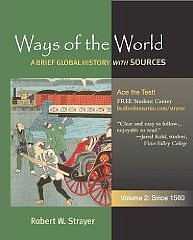
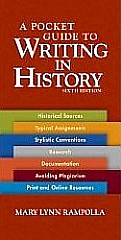
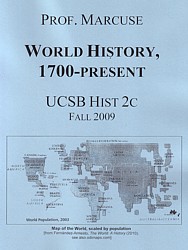
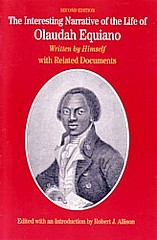 Excellent
site with an
Excellent
site with an 